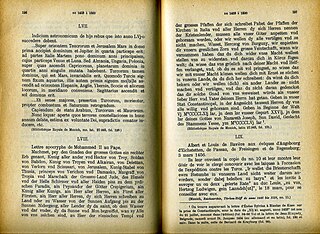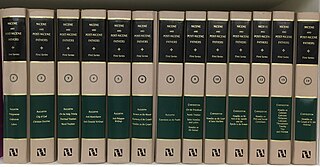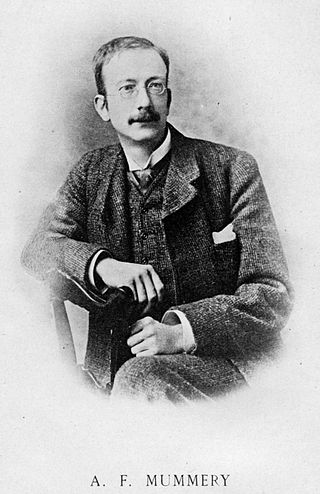
Apocrypha are written works, often of unknown authorship or doubtful origin. In Christianity, the word apocryphal (ἀπόκρυφος) was first applied to writings which were to be read privately rather than in the public context of church services -- edifying Christian works which were not considered canonical Scripture. In the wake of the Protestant Reformation, the word apocrypha came to mean "false, spurious, bad, or heretical".

A definition is a statement of the meaning of a term. Definitions can be classified into two large categories: intensional definitions, and extensional definitions. Another important category of definitions is the class of ostensive definitions, which convey the meaning of a term by pointing out examples. A term may have many different senses and multiple meanings, and thus require multiple definitions.
A dramaturge or dramaturg is a literary adviser or editor in a theatre, opera, or film company who researches, selects, adapts, edits, and interprets scripts, libretti, texts, and printed programmes, consults authors, and does public relations work. Its modern-day function was originated by the innovations of Gotthold Ephraim Lessing, an 18th-century German playwright, philosopher, and theatre theorist.
Religion and mythology differ in scope but have overlapping aspects. Both are systems of concepts that are of high importance to a certain community, making statements concerning the supernatural or sacred. Generally, mythology is considered one component or aspect of religion. Religion is the broader term: besides mythological aspects, it includes aspects of ritual, morality, theology, and mystical experience. A given mythology is almost always associated with a certain religion such as Greek mythology with Ancient Greek religion. Disconnected from its religious system, a myth may lose its immediate relevance to the community and evolve—away from sacred importance—into a legend or folktale.

Tragedy is a genre of drama based on human suffering and, mainly, the terrible or sorrowful events that befall a main character. Traditionally, the intention of tragedy is to invoke an accompanying catharsis, or a "pain [that] awakens pleasure", for the audience. While many cultures have developed forms that provoke this paradoxical response, the term tragedy often refers to a specific tradition of drama that has played a unique and important role historically in the self-definition of Western civilization. That tradition has been multiple and discontinuous, yet the term has often been used to invoke a powerful effect of cultural identity and historical continuity—"the Greeks and the Elizabethans, in one cultural form; Hellenes and Christians, in a common activity," as Raymond Williams puts it.
Pierce Egan (1772–1849) was a British journalist, sportswriter, and writer on popular culture. His popular book Life in London, published in 1821, was adapted into the stage play Tom and Jerry, or Life in London later that year, which became the first play to have a continuous run of 100 performances in London while at the Adelphi Theatre in the West End.

A double entendre is a figure of speech or a particular way of wording that is devised to have a double meaning, of which one is typically obvious, whereas the other often conveys a message that would be too socially awkward, sexually suggestive, or offensive to state directly.

The Brahmanas are Vedic śruti works attached to the Samhitas of the Rig, Sama, Yajur, and Atharva Vedas. They are a secondary layer or classification of Sanskrit texts embedded within each Veda, which explain and instruct on the performance of Vedic rituals. In addition to explaining the symbolism and meaning of the Samhitas, Brahmana literature also expounds scientific knowledge of the Vedic Period, including observational astronomy and, particularly in relation to altar construction, geometry. Divergent in nature, some Brahmanas also contain mystical and philosophical material that constitutes Aranyakas and Upanishads.

Yajna refers in Hinduism to any ritual done in front of a sacred fire, often with mantras. Yajna has been a Vedic tradition, described in a layer of Vedic literature called Brahmanas, as well as Yajurveda. The tradition has evolved from offering oblations and libations into sacred fire to symbolic offerings in the presence of sacred fire (Agni).

Professor John Norman Collie FRSE FRS, commonly referred to as J. Norman Collie, was an English scientist, mountaineer and explorer.

Sacred tradition is a theological term used in Christian theology. According to this theological position, sacred tradition is the foundation of the doctrinal and spiritual authority of Christianity and of the Bible. Thus, the Bible must be interpreted within the context of sacred tradition and within the community of the denomination. The denominations that ascribe to this position are the Catholic, Eastern Orthodox, and Oriental Orthodox churches, and the Assyrian churches.

Albert Frederick Mummery, was an English mountaineer and author. Although most notable for his many and varied first ascents put up in the Alps, Mummery, along with J. Norman Collie, Geoffrey Hastings, and two Gurkhas are also the first men in recorded history to have attempted to summit one of the Himalayan eight-thousanders.
The 1988–89 Calgary Flames season was the ninth season for the Calgary Flames and 17th for the Flames franchise in the National Hockey League (NHL). They won their second consecutive Presidents' Trophy as the NHL's top regular season club and went on to win the first Stanley Cup championship in franchise history, defeating the Montreal Canadiens in the 1989 Stanley Cup Final. Al MacInnis won the Conn Smythe Trophy as the most valuable player of the playoffs.

A dogma of the Catholic Church is defined as "a truth revealed by God, which the magisterium of the Church declared as binding". The Catechism of the Catholic Church states:
The Church's Magisterium asserts that it exercises the authority it holds from Christ to the fullest extent when it defines dogmas, that is, when it proposes, in a form obliging Catholics to an irrevocable adherence of faith, truths contained in divine Revelation or also when it proposes, in a definitive way, truths having a necessary connection with these.

Seigler Springs is a set of springs in Lake County, California around which a resort developed in the 19th century. In the 1930s the resort was expanded, and in 1947 an airport opened nearby. The resort declined in the 1960s. Part of it was separated out and became a residential subdivision, while part became a religious retreat. The 2015 Valley Fire caused great damage.
Myth is a folklore genre consisting of narratives that play a fundamental role in a society, such as foundational tales or origin myths. Since "myth" is popularly used to describe stories that are not objectively true, the identification of a narrative as a myth can be highly controversial. Many religious adherents believe that the narratives told in their respective religious traditions are historical without question, and so object to their identification as myths while labelling traditional narratives from other religions as such. Hence, some scholars may label all religious narratives as "myths" for practical reasons, such as to avoid depreciating any one tradition because cultures interpret each other differently relative to one another. Other scholars may abstain from using the term "myth" altogether for purposes of avoiding placing pejorative overtones on sacred narratives.

A sacrament is a Christian rite that is recognized as being particularly important and significant. There are various views on the existence, number and meaning of such rites. Many Christians consider the sacraments to be a visible symbol of the reality of God, as well as a channel for God's grace. Many denominations, including the Catholic, Lutheran, Anglican, Methodist, and Reformed, hold to the definition of sacrament formulated by Augustine of Hippo: an outward sign of an inward grace, that has been instituted by Jesus Christ. Sacraments signify God's grace in a way that is outwardly observable to the participant.
Henry Caldwell Cook (1886–1939) was a British educator known for his book The Play Way, which contended that doing was a better learning method than reading and listening, and that youth study through play.

A Mummery tent is a small, lightweight tent designed and used by Albert Frederick Mummery in the 1880s and named after him. Fred Mummery (1855–1895) was an English pioneer in alpine climbing, making many first ascents, and he developed this type of tent for his lightweight expeditions.

John Percy Lockhart-Mummery FRCS, was a British surgeon at St Mark's Hospital, London, who devised a classification of rectal cancer and described familial polyposis which led to the formation of the polyposis registry. He was the author of several books, including Diseases of the Rectum and Colon and their Surgical Treatment (1923) and The Origin of Cancer (1934). His work on colorectal surgery earned him the nickname "King Rectum".